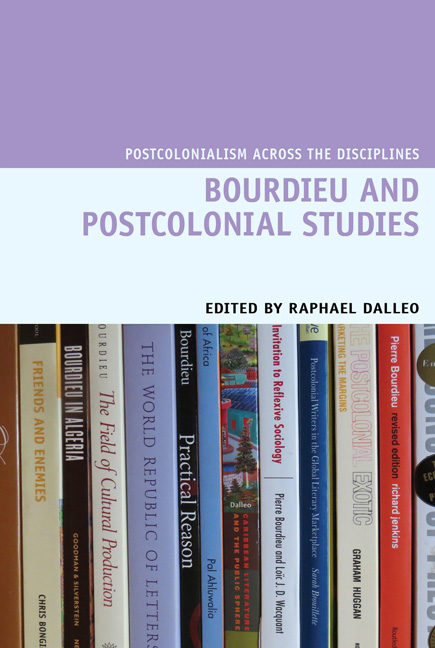Book contents
- Frontmatter
- Contents
- Permissions
- Introduction
- 1 Writing at the Margins: Postcolonialism, Exoticism and the Politics of Cultural Value (from The Postcolonial Exotic)
- 2 Exiles on Main Stream: Valuing the Popularity of Postcolonial Literature (from Friends and Enemies)
- 3 Postcolonial Authorship Revisited (from Postcolonial Writers in the Global Literary Marketplace)
- 4 Bourdieu and Fanon on Algeria
- 5 Style as Habitus: World Literature, Decolonization and Caribbean Voices
- 6 Playing the Game? The Publication of Oswald Mtshali
- 7 Fields in Formation: English Studies and National Literature in South Africa (with a Brazilian Comparison)
- 8 Archived Relationships: Pierre Bourdieu and Writers of the Caribbean Diaspora
- 9 Irony in the Dungeon: Anamnesis and Emancipation
- About the Contributors
- Index
4 - Bourdieu and Fanon on Algeria
- Frontmatter
- Contents
- Permissions
- Introduction
- 1 Writing at the Margins: Postcolonialism, Exoticism and the Politics of Cultural Value (from The Postcolonial Exotic)
- 2 Exiles on Main Stream: Valuing the Popularity of Postcolonial Literature (from Friends and Enemies)
- 3 Postcolonial Authorship Revisited (from Postcolonial Writers in the Global Literary Marketplace)
- 4 Bourdieu and Fanon on Algeria
- 5 Style as Habitus: World Literature, Decolonization and Caribbean Voices
- 6 Playing the Game? The Publication of Oswald Mtshali
- 7 Fields in Formation: English Studies and National Literature in South Africa (with a Brazilian Comparison)
- 8 Archived Relationships: Pierre Bourdieu and Writers of the Caribbean Diaspora
- 9 Irony in the Dungeon: Anamnesis and Emancipation
- About the Contributors
- Index
Summary
As we approach the question of Bourdieu's place in postcolonial studies, I propose to consider his relationship to another thinker whose ideas are often considered foundational to the field: Frantz Fanon. Although there is no evidence that Fanon and Bourdieu ever met, they were both prominent intellectuals stationed in Algeria during the War of Independence: Fanon arrived in 1953, working as a psychoanalyst at a hospital; and Bourdieu arrived in 1955 to do his military service. They developed many of their most famous ideas in a shared context, Algeria during the War of Independence, and although they only rarely engage explicitly with each other's works, implicitly they frequently respond to each other's ideas.
A comparative reading of Bourdieu and Fanon provides a means of rethinking the relationship between Bourdieu and postcolonialism. Although Bourdieu was highly critical of the politics of Fanon and Jean-Paul Sartre, Bourdieu's and Fanon's theories line up remarkably well, and can be profitably put into dialogue to yield new insights about the forms of violence, domination and revolution that emerge from colonization. What Fanon adds to Bourdieu is a consideration of the role of race; and Bourdieu brings to Fanon insights into the workings of social classes and the process of symbolic domination.
In particular, the imagined dialogue between these two thinkers will demonstrate the following. First, how Fanon's psychoanalysis shows the fundamental role of race in the interplay between habitus, field and capital that Bourdieu describes. Conversely, Bourdieu's hierarchical division of social and economic classes, which do not correspond neatly to Fanon's racial categories in the case of Algeria, illustrates the necessity of taking social stratification into account in studies on colonialism. Despite the animosity that existed between them, there are in fact many similarities in the way that Bourdieu and Fanon describe colonialism as a system maintained through brute force that cannot be reformed. Moreover, Fanon's analysis of psychological violence in colonization relates closely to Bourdieu's notion of symbolic domination. However, both authors diverge greatly with regard to the relationship that they perceive between the peasant class and modernity, which determines the role that each believes this class will (or will not) play in the revolution.
- Type
- Chapter
- Information
- Bourdieu and Postcolonial Studies , pp. 102 - 118Publisher: Liverpool University PressPrint publication year: 2016



